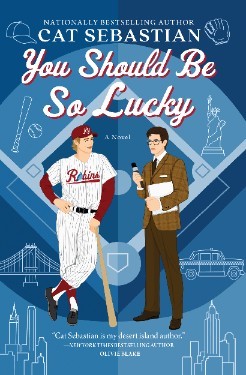After a year of doing basically nothing—although Lilian is forever clapping him on the shoulder and earnestly telling him that survival is something, it's wonderful, darling, a testament to his strength—Mark Bailey finds that it's a bit of a shock to the system to discover he's in the middle of a meeting with his boss.
Sure, they're in a grimy Irish bar instead of the Chronicle's wood-paneled conference room, and they're drinking watered-down gin instead of coffee, and nobody's there to take notes or waste time by talking about gold, but it's still a meeting no matter how Mark looks at it, God help him.
"So here's the problem," Andy says. Andy is—well, when he isn't busy being Andrew Fleming III, the Chronicle's publisher, he and Mark are friends, or whatever you call it when you're both queer and work at the same place and keep one another's secrets.
"We need to convert weekday commute readers to Sunday subscription readers," Andy goes on. "The Sunday paper is where we make money."
Mark's been hearing versions of this for months. After three drinks, Andy's capable of delivering an entire lecture, complete with pie charts drawn on the backs of cocktail napkins, about return on investment, dwindling ad sales, and how television will be the ruination of the free press. It's all unspeakably boring, and the only reason Mark hasn't put a stop to it is that it would take an awful lot of energy that he simply does not have.
"A new Sunday magazine is going to replace the old pullout supplement starting in July," Andy goes on. "It'll be glossy and in full color, and we want it to attract a different set of readers. I was looking at those articles you wrote a couple years back for Esquire and The New Yorker, and even some of the longer pieces you used to write for our arts and culture section. That's exactly what I want."
Andy's being tactful by not saying something like "back when you used to do actual work instead of writing book reviews every few months for fifty-dollars cash." Technically, Mark resigned in February 1959 but never quite got out of the habit of coming in to work. This may be pushing the envelope on eccentricity, but he's pretty sure that ship has sailed; he's firmly in Miss Havisham territory now, haunting the dusty and half-empty fifth floor of the Chronicle building, and eldritch entity that junior reporters warn one another about.
"According to market research," Andy goes on, "sports coverage is one of the top reasons people buy the paper, so I'm thinking the magazine needs stories with a sports angle."
All this strikes Mark as exceptionally pie-in-the-sky; he's not optimistic by nature and even less so where newspapers are concerned. If Andy didn't look like a man about to ask a favor, he'd assume this had nothing to do with him. His magazine features were mostly profiles of architects and fashion designers. He hasn't written a word about sports since he was on his high school newspaper, nursing an ill-fated crush on the quarterback.
Mark drains his gin and waves the bartender over for some more. "You need a highbrow sports feature for the magazine, and you want me to write it."
"Yes," says Andy, drawing out the syllable and looking at his drink instead of Mark. "You know when a paper publishes a weekly diary by an athlete over the course of a season?"
